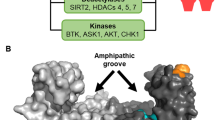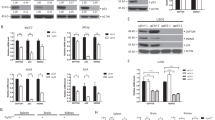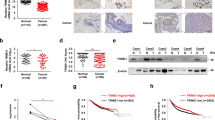Abstract
The 14-3-3σ, upregulated by p53 in response to DNA damage, can have a positive-feedback impact driving p53 activities and is a human cancer epithelial marker downregulated in various tumors. However, the precise roles of 14-3-3σ during tumorigenesis are not well characterized. Here, we show that 14-3-3σ is a critical regulator of murine double minute oncogene (MDM2). 14-3-3σ interacts with MDM2 at the RING domain. The C-terminal region of 14-3-3σ binds to MDM2 very efficiently. Importantly, 14-3-3σ overexpression leads to destabilization of MDM2 through enhancing MDM2 self-ubiquitination and accelerating turnover rate. Conversely, loss of 14-3-3σ results in a significant increase in MDM2 protein. Moreover, live-cell images indicated that 14-3-3σ can affect the location of MDM2 from the nucleus to the cytoplasm, and that MDM2-mediated cytoplasmic localization of p53 can be reversed by the presence of 14-3-3σ. Significantly, we further showed that 14-3-3σ causes MDM2 downregulation, thereby stabilizing p53 and inhibiting tumor growth in animal tumors. Also, 14-3-3σ blocks MDM2-mediated retinoblastoma degradation and p53 NEDDylation. Our results provide evidence that 14-3-3σ is a pivotal MDM2 regulator involved in blocking a variety of activities of MDM2.
This is a preview of subscription content, access via your institution
Access options
Subscribe to this journal
Receive 50 print issues and online access
$259.00 per year
only $5.18 per issue
Buy this article
- Purchase on Springer Link
- Instant access to full article PDF
Prices may be subject to local taxes which are calculated during checkout







Similar content being viewed by others
References
Chan TA, Hermeking H, Lengauer C, Kinzler KW, Vogelstein B . (1999). 14-3-3Sigma is required to prevent mitotic catastrophe after DNA damage. Nature 401: 616–620.
Fang S, Jensen JP, Ludwig RL, Vousden KH, Weissman AM . (2000). Mdm2 is a RING finger-dependent ubiquitin protein ligase for itself and p53. J Biol Chem 275: 8945–8951.
Ferguson AT, Evron E, Umbricht CB, Pandita TK, Chan TA, Hermeking H et al. (2000). High frequency of hypermethylation at the 14-3-3 sigma locus leads to gene silencing in breast cancer. Proc Natl Acad Sci USA 97: 6049–6054.
Fu H, Subramanian RR, Masters SC . (2000). 14-3-3 proteins: structure, function, and regulation. Annu Rev Pharmacol Toxicol 40: 617–647.
Geyer RK, Yu ZK, Maki CG . (2000). The MDM2 RING-finger domain is required to promote p53 nuclear export. Nat Cell Biol 2: 569–573.
He TC, Zhou S, da Costa LT, Yu J, Kinzler KW, Vogelstein B . (1998). A simplified system for generating recombinant adenoviruses. Proc Natl Acad Sci USA 95: 2509–2514.
Hermeking H, Lengauer C, Polyak K, He TC, Zhang L, Thiagalingam S et al. (1997). 14-3-3 sigma is a p53-regulated inhibitor of G2/M progression. Mol Cell 1: 3–11.
Iwakuma T, Lozano G . (2003). MDM2, an introduction. Mol Cancer Res 1: 993–1000.
Laronga C, Yang HY, Neal C, Lee MH . (2000). Association of the cyclin-dependent kinases and 14-3-3 sigma negatively regulates cell cycle progression. J Biol Chem 275: 23106–23112.
Lee MH, Lozano G . (2006). Regulation of the p53-MDM2 pathway by 14-3-3 sigma and other proteins. Semin Cancer Biol 16: 225–234.
Lee MH, Reynisdottir I, Massague J . (1995). Cloning of p57KIP2, a cyclin-dependent kinase inhibitor with unique domain structure and tissue distribution. Genes Dev 9: 639–649.
Miwa S, Uchida C, Kitagawa K, Hattori T, Oda T, Sugimura H et al. (2006). Mdm2-mediated pRB downregulation is involved in carcinogenesis in a p53-independent manner. Biochem Biophys Res Commun 340: 54–61.
Momand J, Jung D, Wilczynski S, Niland J . (1998). The MDM2 gene amplification database. Nucleic Acids Res 26: 3453–3459.
Oliner JD, Kinzler KW, Meltzer PS, George DL, Vogelstein B . (1992). Amplification of a gene encoding a p53-associated protein in human sarcomas. Nature 358: 80–83.
Sdek P, Ying H, Chang DL, Qiu W, Zheng H, Touitou R et al. (2005). MDM2 promotes proteasome-dependent ubiquitin-independent degradation of retinoblastoma protein. Mol Cell 20: 699–708.
Stommel JM, Marchenko ND, Jimenez GS, Moll UM, Hope TJ, Wahl GM . (1999). A leucine-rich nuclear export signal in the p53 tetramerization domain: regulation of subcellular localization and p53 activity by NES masking. EMBO J 18: 1660–1672.
Wang C, Ivanov A, Chen L, Fredericks WJ, Seto E, Rauscher III FJ et al. (2005). MDM2 interaction with nuclear corepressor KAP1 contributes to p53 inactivation. EMBO J 24: 3279–3290.
Xirodimas DP, Saville MK, Bourdon JC, Hay RT, Lane DP . (2004). Mdm2-mediated NEDD8 conjugation of p53 inhibits its transcriptional activity. Cell 118: 83–97.
Yang H, Wen YY, Zhao R, Lin YL, Fournier K, Yang HY et al. (2006). DNA damage-induced protein 14-3-3 {sigma} inhibits protein kinase B/Akt activation and suppresses Akt-activated cancer. Cancer Res 66: 3096–3105.
Yang HY, Wen YY, Chen CH, Lozano G, Lee MH . (2003). 14-3-3 sigma positively regulates p53 and suppresses tumor growth. Mol Cell Biol 23: 7096–7107.
Yu J, Zhang L, Hwang PM, Kinzler KW, Vogelstein B . (2001). PUMA induces the rapid apoptosis of colorectal cancer cells. Mol Cell 7: 673–682.
Zhang R, Wang H . (2000). MDM2 oncogene as a novel target for human cancer therapy. Curr Pharm Des 6: 393–416.
Zhou BP, Liao Y, Xia W, Zou Y, Spohn B, Hung MC . (2001). HER-2/neu induces p53 ubiquitination via Akt-mediated MDM2 phosphorylation. Nat Cell Biol 3: 973–982.
Acknowledgements
We thank Drs Vogelstein, Zhang, Kamitani, Shenoy, Wahl and Maki for valuable reagents, and Bill Spohn for live-cell imaging help. This work was supported in part by the NIHRO1CA (089266) and Cancer Center Core Grant (CA16672).
Author information
Authors and Affiliations
Corresponding author
Rights and permissions
About this article
Cite this article
Yang, HY., Wen, YY., Lin, Yl. et al. Roles for negative cell regulator 14-3-3σ in control of MDM2 activities. Oncogene 26, 7355–7362 (2007). https://doi.org/10.1038/sj.onc.1210540
Received:
Revised:
Accepted:
Published:
Issue Date:
DOI: https://doi.org/10.1038/sj.onc.1210540
Keywords
This article is cited by
-
The apple 14-3-3 protein MdGRF11 interacts with the BTB protein MdBT2 to regulate nitrate deficiency-induced anthocyanin accumulation
Horticulture Research (2021)
-
Regulation of p53 by the 14-3-3 protein interaction network: new opportunities for drug discovery in cancer
Cell Death Discovery (2020)
-
Gene domain-specific DNA methylation episignatures highlight distinct molecular entities of ADNP syndrome
Clinical Epigenetics (2019)
-
p53 pathway dysfunction is highly prevalent in acute myeloid leukemia independent of TP53 mutational status
Leukemia (2017)
-
MDM2’s social network
Oncogene (2014)



